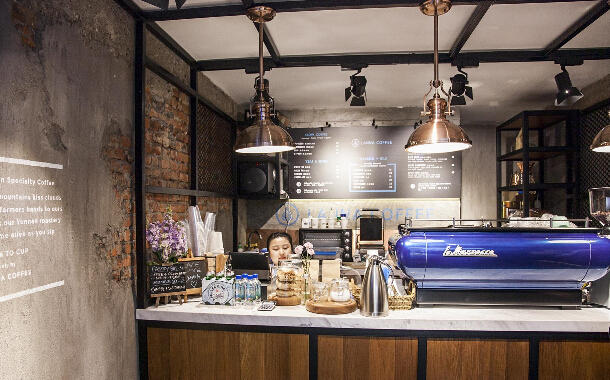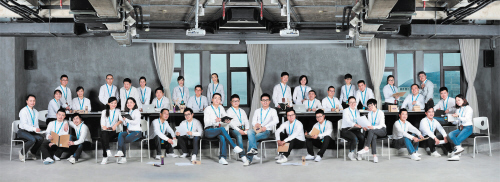Why do you choose Beijing to start a business between a cup of coffee and a city?

History is made up of countless coordinates. if you find a focus for "mass entrepreneurship and innovation" in Beijing, it is usually difficult to tell whether it is an enterprise, an entrepreneur, an event or a moment. But if you look at it in larger scale, Beijing is undoubtedly the weather vane of China's entrepreneurship and innovation.
"I have seen startups gather all over the world, but Beijing shocked me." Steve Blanco, the godfather of Silicon Valley, sighed when he returned to the United States from Beijing. Data show that in 2014, the number of newly established science and technology enterprises in Zhongguancun alone in Beijing exceeded 13000.
Why Beijing? The reason can start with a cup of coffee in Zhongguancun Entrepreneurship Street by Premier Li Keqiang in May this year, which reflects a perfect entrepreneurial ecosystem in Beijing. there are leading enterprises, institutions of higher learning, scientific research institutions, entrepreneurial service institutions, entrepreneurial culture, talent, capital …...
More than one Entrepreneurship Street
Liu Chuanzhi's Lenovo Star and Xu Dan's 3W Caf é welcomed Li Keqiang's visit on the same day. Compared with Lenovo, who has been in business for more than 30 years, Xu's project is only two years old, and the two companies are now neighbors.
From beginning to end, Zhongguancun is the core symbol of scientific and technological innovation in Beijing and even in China, and now "mass entrepreneurship and innovation" has been given a new meaning by a pedestrian street.
Regardless of the size of the incubation area or the rent income, it only depends on how many "new services" the incubator can provide for entrepreneurs. With this new set of standards, Beijing has supported the rapid development of a number of innovative incubators and mass innovation spaces, such as garage coffee, 3W coffee and creator space, and created dozens of "dream factories" that help entrepreneurs realize their dreams.
According to incomplete statistics, Zhongguancun Entrepreneurship Street has hatched more than 600 start-up enterprises in just one year, of which more than 350 enterprises have obtained financing, with an average financing of 5 million yuan per enterprise, with a total financing of more than 1.75 billion yuan.
This street is only a microcosm of Beijing's entrepreneurial ecosystem, or even a microcosm of Beijing's Haidian District's entrepreneurial ecosystem. Not long ago, the "Entrepreneurship Cradle Program" in Shunyi District of Beijing was launched, with a special support fund of 100 million yuan every year to support the construction of entrepreneurial talents, entrepreneurial bases, entrepreneurial service institutions and entrepreneurial environment. In addition to financial support, it also opens up green channels for entrepreneurial talents entering the district, such as transportation, social security, children's schooling, medical care, public rental housing for talents, and so on. Beijing's first entrepreneurial theme community Youth Huihui, and Coffee Community Youth Huihui, was unveiled in Dongcheng District, with the aim of building a new and professional entrepreneurial support service platform.
In Chaoyang, Fengtai, Shijingshan. Business plans like strong policy support are updated every day.
The districts and counties are taking action, and some policies for the professional fields of the whole city are also fermenting, releasing and landing. In January this year, the department of Beijing people's Society disclosed that it will improve the entrepreneurial service system this year, integrate existing policies, and at the same time study and formulate social insurance subsidy policies to encourage urban and rural self-employment (self-employment). Explore and study the discount policy on business loans for independent entrepreneurship to help alleviate the difficulties in entrepreneurial financing.
In the education system, the Beijing Municipal Education Commission officially launched the Beijing University High-quality Employment Entrepreneurship Program in June this year, which will spend 32 million yuan to reward outstanding entrepreneurial teams. the three newly built entrepreneurial parks will also provide free venues for college students to start their own businesses.
An entrepreneur who is working in a start-up cafe told the Beijing Business Daily, "there are many entrepreneurial support policies in Beijing. Looking for venues, there are entrepreneurial cafes; looking for funds, there are angel investors; looking for talents. There are countless technical and management talents with entrepreneurial dreams; lack of experience, there are entrepreneurial mentors and various entrepreneurial training camps." The manpower, capital, market and other nutrients needed for the growth of start-ups can be obtained one by one, making it easier to start a business.
It is no longer so difficult to find investment.
When the policy falls to the ground, entrepreneurs can not get around the power of capital. But now, sitting opposite a cup of coffee may be venture capital firms or private equity funds.
According to the report of Investment China Group, a well-known investment market information consultancy, in 2014, Beijing raised US $6.972 billion in venture capital, ranking first in the country, while private equity investment in Beijing also ranked first in the country with 74 cases and US $16 billion.
The influx of capital stems from the attention and favor of investment institutions to Beijing. Among the top 10 Chinese venture capital institutions announced by the China Equity Investment Fund Association in 2014, 9 institutions' headquarters or branches and offices are located in Beijing. In 2014, 9 of the top 10 Chinese private equity institutions also have branches or offices in Beijing.
With the rise of emerging capital operation modes such as equity crowdfunding, P2P online lending, and online banking, equity crowdfunding platforms such as Angel remittance are not only start-ups themselves, but also provide financing services for countless start-ups.
July 9 this year, Zhongguancun equity crowdfunding alliance (funding) announced the establishment. Guo Hong, director of the Zhongguancun Administrative Committee, said that equity crowdfunding is a revolution, even if it does not understand technology, lack of resources, and even has shortcomings in many aspects, it does not matter for today's entrepreneurs. Resources that need to start a business can be gathered through crowdfunding. So crowdfunding is essentially not crowdfunding, but crowdfunding resources.
The virtuous circle of "entrepreneur-entrepreneur-angel investor" is also taking shape rapidly in Beijing venture capital circle.
In 2013, a film based on the three founders of New Oriental Education became popular in China. Xu Xiaoping and Wang Qiang, two of the "China Partners", founded ZhenFund after the company went public, incarnating as "Angel" to help young people start a business. Jumei, Jiayuan of the century, and Lanting gathered momentum to get the first angel fund in ZhenFund, and then listed on the Nasdaq in the United States one after another.
Under the background of the innovation and integration of a variety of entrepreneurial financing channels, "angel investment + partnership + equity crowdfunding" has become the "financial fulcrum" of start-ups in Beijing. According to the 2014 days Investment report, 80 per cent of angel investors across the country have invested in Zhongguancun enterprises, accounting for more than 60 per cent of the country's total investment.
Entrepreneurial buddies are waiting for you.
"how many years from now, hesitation at that time may become a joke." Zhao Bo, an associate professor in the department of agriculture at Beijing Agricultural University, laughed at himself. What he called "hesitation" happened five years ago. "it's not appropriate for a professor to be a boss." Every time Zhao Bo's idea of running a company surfaced, he was immediately pressed back by himself. In 2010, he was ruthless and registered an enterprise. However, he wrote his wife's name in the corporate column.
In January 2014, an email entitled "more than 70% of teachers' job inventions belong to themselves" appeared in Zhao Bo's mailbox. The sender is the competent department of the school. "University teachers can leave their posts to start a business, and the income from the transformation of scientific and technological achievements in colleges and universities can reward adults with scientific and technological achievements by not less than 70%." Zhao Bo was excited by the contents of the email.
This email was sent to the mailbox of every teacher in the school. Behind it is the introduction of "some opinions on accelerating the Transformation of Scientific and technological achievements and Collaborative Innovation of Science and Technology in Colleges and Universities (for trial implementation)" (hereinafter referred to as "Beijing University Ten articles"). The part-time enterprises run by university teachers have finally been recognized by the government and school officials.
With the introduction of the "Ten principles of Beijing School", more and more capable and willing students and teachers are coming out of the ivory tower and becoming a member of the entrepreneurial army. Colleges and universities are the most extensive talent base for innovation and entrepreneurship. Beijing, which has 104 universities (8 985 and 24 211), has always had a deep understanding of this.
In fact, it is much more than that. New changes have taken place in terms of talent, both from the policy and market dimensions. Another important identity of Xu Shan is the chairman of Lagu.com, which is a new recruitment platform focusing on the flow of talents in vertical fields such as the Internet and finance. Liepin, Zhou Botong recruitment, LinkedIn and other similar companies are also doing "new mode of selling talents".
In addition to Beijing's "self-production and marketing of talents", the city is also attracting more non-local and even overseas talents. At the "2015 overseas Red son Beijing trip" jointly sponsored by the Organization Department of the Beijing Municipal CPC Committee, more than 85% of the more than 100 invited personnel received doctoral degrees, and they had a strong intention to come to Beijing to innovate and start a business. all entrepreneurial overseas scholars brought specific projects to Beijing to attend the meeting, covering more than 10 fields such as biomedicine, electronic information, financial management, culture and education, new energy and new materials.
In 2015, there were 178 young talents in Beijing in the 11th batch of Thousand talents Plan in Beijing, far exceeding Shanghai, Guangzhou and Shenzhen, according to the political Research Office of the Shenzhen Municipal Government.
Let competition determine the market
A single flower does not make a spring. The same is true of entrepreneurial innovation. Under the condition that everything is ready, market competition is the only criterion for testing the ability of innovation and entrepreneurship, and it is also the main driving force that promotes the never-ending wave of innovation and entrepreneurship. This is like Sina to Sohu, 360th to Jinshan, and Marketplace to 58.com.
As of June 9, the number of listed enterprises in Zhongguancun reached 275. Behind this number, a large number of entrepreneurial groups are emerging. Lei Jun from Jinshan brought out Xiaomi, Feng Xin brought out Storm Player, Wang Feng brought out Lingang online, a successful company derived a business group, and they were colleagues and now competitors.
Baidu, Jinshan, Sohu, Tencent, Huawei, Motorola. According to the data, 47% of the newly founded enterprises in Zhongguancun are backbone independent entrepreneurs in 2013. "independent entrepreneurs" have won the favor of capital by virtue of their experience, and the same "entrepreneurial department" has gradually formed a "circle" of mutual assistance and sharing, and large companies in Beijing are becoming the "cradle of entrepreneurs" to cultivate "competing heroes".
There is no shortage of serial entrepreneurs who have failed over and over again. Lan Ningyu, founder and CEO of Angel Huihui, was the founder, co-founder or partner of six start-up companies before founding Angel Huihui. CEO Li Mingshun, who has 13 years of experience in the Internet industry, is already his fifth start-up project.
There are many such people, in fact, the last competitive failure led to this success, and their success will force competitors to challenge constantly, which is to some extent the direct driving force of innovation and entrepreneurship. Just like Zhou Hongyi, who is leading Qihoo 360 to start an internal business in intelligent hardware, he was once a loser under Xiaomi and Baidu.
Encourage innovation and tolerate failure. In Zhongguancun, failure is not a disgrace, but a medal of honor. Even the more failures you experience, the more experienced people think you are. "in Beijing's entrepreneurial ecosystem, if you tell others that you have failed to start a business and put all your money into it, no one will look down upon you, but a lot of people will respect you." Xia Yingqi, chief advisor of Beijing overseas Scholars Center, said.
Take entrepreneurship as a way of life and surpass yourself in non-stop. According to the data, continuous entrepreneurs in Beijing account for 37% of all entrepreneurs. Not afraid of failure, always on the road to starting a business, this is the entrepreneurial spirit that keeps flowing in the hearts of entrepreneurs in Beijing.
Zhang Xuwang, reporter of Beijing Business Daily, Han Jielin
Number theory
275 listed enterprises
Data show that from January to May this year, there were 8577 new science and technology enterprises in Zhongguancun, and 21 new listed companies, including 13 on the gem, 4 on the main board, 3 on the small and medium-sized board and 1 on the Nasdaq of the United States. as of June 9, there were a total of 275 listed companies.
More than 130 incubators
According to the 2015 White Paper on China Angel Investment, according to the statistics of Qingke Research Center, there are more than 130 incubators in Zhongguancun, the most active of which include garage coffee shop, Lenovo Star, 3W coffee, Innovation Workshop, Microsoft Accelerator and so on.
The average financing amount of enterprises in Entrepreneurship Street is 5 million yuan.
According to incomplete statistics, Zhongguancun Entrepreneurship Street has hatched more than 600 start-up enterprises in only one year, of which more than 350 enterprises have obtained financing, with an average financing of 5 million yuan per enterprise, with a total financing of more than 1.75 billion yuan.
Half of Forbes' entrepreneurs under the age of 30
According to Forbes' 2015 list of 30 Chinese entrepreneurs under the age of 30, Beijing made the list of 15, accounting for half of the list.
More than half of the students with bachelor's degree or above
By the end of May, the number of employees in Zhongguancun with bachelor's degree or above reached 5215, and the number of expatriates and returnees per 10,000 people reached 5215, an increase of 84 and 3 respectively over the same period last year.
More than 1300 people in Beijing have been selected into the Thousand talents Plan.
In terms of high-end talents, the Zhongguancun demonstration Zone has so far selected 1090 overseas high-level talents of the Thousand talents Plan, accounting for 82% of Beijing's total, accounting for 21% of the country's total, and 424 of the "Sea gathering Project", accounting for 70% of Beijing's total.
Important Notice :
前街咖啡 FrontStreet Coffee has moved to new addredd:
FrontStreet Coffee Address: 315,Donghua East Road,GuangZhou
Tel:020 38364473
- Prev

The first crowdfunding cafe in Changsha has disappeared.
Yujiahui, the first brand of Internet mask, is implementing a partnership mechanism, and all the middle managers of the company have been granted corporate options. The picture shows the first phase partner of the company. In fact, partnering to do business is not a new thing. You provide funds, I have channels, he has skills, learning from strong points to make up for weaknesses, is never a good thing. But a few people come together, you have your opinion, I have mine.
- Next

Starbucks' net income grew by more than 20% in the third quarter.
Starbucks recently released financial results for the third quarter of fiscal year 2015. In the third quarter, Starbucks performed so well that it could even be described as lively, with net income up 22% from $513 million in the same period last year to $627 million. Despite the increase in income tax, Starbucks still achieved high profit growth due to high pre-tax profit in the third quarter. In the third quarter, Starbucks merged with the same
Related
- What brand of black coffee is the most authentic and delicious? what are the characteristics of the flavor of the authentic Rose Summer Black Coffee?
- Introduction to the principle and characteristics of the correct use of mocha pot A detailed course of mocha pot brewing coffee is described in five steps.
- Which is better, decaf or regular coffee? how is decaf made?
- How much is a bag of four cat coffee?
- How about four Cat Coffee or Nestle Coffee? why is it a cheap scam?
- Which is better, Yunnan four Cats Coffee or Nestle Coffee? How about cat coffee? is it a fake scam? why is it so cheap?
- How about Cat Coffee? what grade is a hoax? which instant coffee tastes better, four Cat Coffee, Nestle Coffee or G7 coffee?
- Process flow chart of coffee making-Starbucks coffee making process what coffee tastes good at Starbucks
- The top ten best coffee beans in the world Rose summer coffee or Tanzanian coffee tastes good
- Yunnan four cat coffee is good to drink?_four cat coffee is a big brand? four cat blue mountain coffee is fake?

